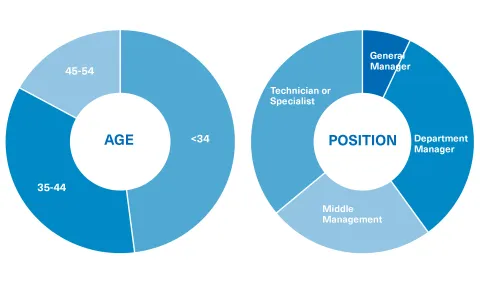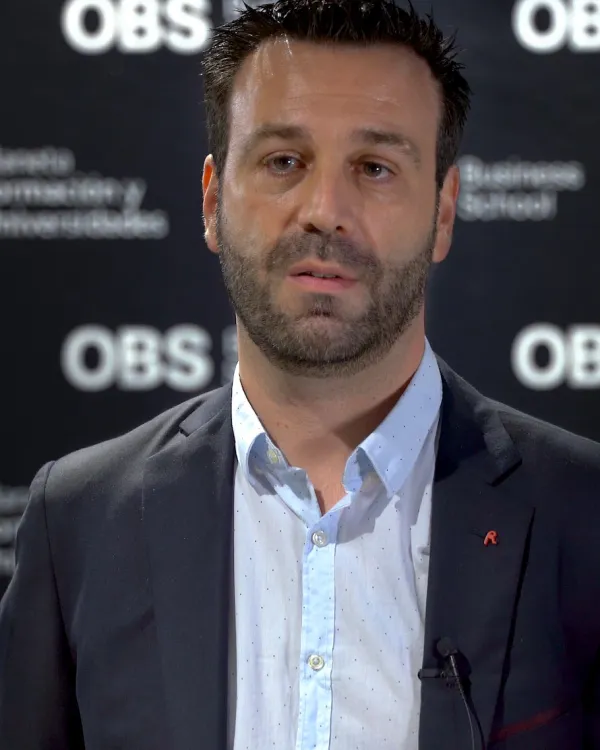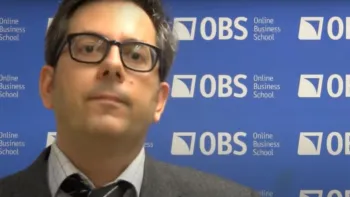
Master in Human Resources Management and Talent Management
- ONLINE
- 60 ECTS
- 7500€
- OPEN CALL
- 12 MONTHS
- SPANISH
The Master's Degree in Human Resources and Talent Management, with a Master's degree in lifelong learning, allows you to develop the technical and essential knowledge that people department managers must master, acquiring the necessary management skills to successfully manage any team and obtain efficient results.
The school is a Recertification Provider of the Society for Human Resource Management (SHRM), so with this Master you will be able to renew the SHRM-CP (Certified Professional) and SHRM-SCP (Senior Certified Professional) certifications awarded by SHRM. If you wish to prepare for SHRM certifications, the programme offers an additional workshop to obtain them.
This Master's programme is ranked 4th in the Human Resources category of El Mundo's ranking.

Master in Human Resources Management and Talent Management (Spanish)

Universitat de Barcelona
Get a double degree from our academic partner, the reference university in Catalonia and Spain with more than 560 years of history behind it.

QS Stars Rating System
We are the first 100% online Business School in the world to receive the QS Stars rating, obtaining the highest distinction, five QS Stars, in the Online Learning category.

aPHR y PHR
OBS successfully prepares you for the aPHR and PHR certifications of the HR Certification Institute through a workshop taught in this programme.
Master in Human Resources and Talent Management Syllabus
Our programme is structured in 3 main blocks and culminates with the Master's final project. In addition, four bootcamps and different additional activities will be carried out during the programme.
Block 1. The organisation of HR
Block 2. Key processes in HR management.
Block 3. Complementary tools for HR management
Master's final project
Bootcamps and additional activities
1. The organisation of HR
The strategic management of Human Resources is the origin of any organisational change. The objective of this module is to provide the knowledge that will enable students to understand the importance of the strategic design of Human Resources policies in organisational management.
Professor: Josep Lluís C. Bosch, Lecturer in the Department of Sociology and Analysis of Organisations at the University of Barcelona.
VIEW LINKEDIN
A good analysis of organisational culture is the best tool for real and profound change. The purpose of the organisation is reflected in the mission and vision, but these elements are often part of the history of the organisation. The aim of this course is to introduce the concepts of organisational climate, culture and change.
Professor: Jordi Colobrans Delgado, Research and Innovation Consultant at Livinglabing
VIEW LINKEDIN
The aim of this module is to reflect on the role that the Human Resources Director should play in the company. To advance towards a vision of the management function in Human Resources from perspectives as different as they are complementary, such as that of strategic partner, promoter of organisational transformations, discoverer and promoter of talent, facilitator of effective competency training, and definer of measurable and financially analysable value indicators.
Professor: Rodolfo Álvarez González, HR Manager Industrial at Hijos de Rivera, S.A.U.
VIEW LINKEDIN
2. Key processes in HR management
The use of social networks has profoundly changed the operations that were traditionally carried out. In this context, the objective of this module is for the student to learn how to make effective use of all the advantages offered by new technologies in the management of human capital. Thus, this module will cover topics such as technologies within the HR department, the basics of selection processes and the selection interview, among others.
Professor: Catalina Payá Uranga, Organisational Development and Change Management at Inspiring Partners & Catunga.
VIEW LINKEDIN
Nowadays, companies are aware that their success depends, to a large extent, on having highly qualified and competitive professionals in their sector, capable of adapting quickly to new market situations and offering an efficient response to new demands. In this environment, training and knowledge management, through training plans, becomes one of the main tools for Human Resources management. The aim of this subject is to provide knowledge linked to the new personalised learning trends.
Professor: Lorenzo Muriel Redondo, Director of the Organisational Area at Carl Rogers Institute.
VIEW LINKEDIN
Carrying out a good competency analysis of the entire organisation offers the possibility of adapting its objectives to each job position. From the result of this analysis we can measure performance and performance. The aim of this module is to study in depth the strategies, methods and instruments that exist for talent management in different types of organisation, as well as to learn how to develop competency models.
Professor: Josep Ginesta, General Secretary at PIMEC.
VIEW LINKEDIN
Compensation management has changed gradually over the last 20 years. From the times of salary administration, where the existence of commissions and bonuses was already an innovation, to the times of total compensation, including emotional pay, where the key is to define a value proposition for each employee that satisfies all their motivations: financial, social, family, professional, etc. The aim of this module is to introduce the concept of emotional pay, within compensation and benefits, as well as its role in recruitment.
Professor: Albert Pascual Vallés, Director of People Management at Fluidra's Shared Services Centre.
3. Complementary tools for HR management
Recent changes in people management models lead to management by objectives and projects. Even the structure of the organisation must be able to adapt to teamwork on the basis of working groups. This transition is often referred to as organisational development. The aim of the module is to teach project management tools, which at the same time require the construction of teams based on groups.
Professor: Carles Adell Martinez, Head of projects and maintenance of the operations area at Bodegas Familia Torres.
This subject offers an integrated vision of CSR, its strategies and actions in organisations, based on different models implemented. Among them, emphasis will be placed on the most basic tool: diversity management. This subject also deals with coaching as a change management tool aimed at understanding the person in a global way.
Professor: Roser Santamaría Bosch, Coordinator of the Entrepreneurship and Social Innovation area at CitiLab.
VIEW LINKEDIN
Knowing the organisation's stakeholders, through traditional marketing tools, allows the Human Resources Director to prepare messages, effectively segment audiences and choose the most effective communication channels. Having well communicated strategic objectives allows a better evaluation of them, as well as the development of a culture of their own. The objective of this module is to establish the guidelines for the development of an Internal Communication Plan coherent with the strategy, capable of bringing together all stakeholders.
Professor: Luís Fernando Fernández Sánchez, Council of State. Council of State. Director of Institutional and International Relations.
VIEW LINKEDIN
Master's Final Project and Additional Activities
This programme is designed to complement the content of the thematic blocks with the necessary training to achieve their internalisation. The training is conceived from a threefold perspective: technical assistance, personal support and individual and group challenges that are necessary to achieve the objectives set.
Pre-Masters Bootcamps
The student will have the opportunity to take 3 Pre-Master Bootcamps that will be opened progressively and can be taken at any time. Once the course has been completed and passed, a certificate of completion will be awarded.
- Bootcamp 1. Personal Branding
- Bootcamp 2. Data Storytelling
- Bootcamp 3. Creative thinking and innovation
- Bootcamp 4. IA Generativa: Ingeniería de Prompts
In addition, students will also have the opportunity to take these pre-master courses; however, these are available in English only:
- Building Your Professional Brand for Employability and Career Success
- Finance Fundamentals
- Organizational Well-Being
Introductory workshop | Campus Training
Before the start of the academic year, students will have the opportunity to attend an introductory workshop on the Campus where they will be provided with the tools and knowledge necessary for the correct use of the platform during the academic year.
Professional Development Programme (PDP)
Two weeks before the start of the academic year, students will be able to participate in a professional development programme where they will work hand in hand with a teacher to develop different skills such as time management, productivity and stress management and emotional intelligence. Upon completion of the workshop, and provided that the relevant activities have been carried out, a certificate of completion can be obtained.
The objective of the Final Project of the Master's Degree in Human Resources and Talent Management is the practical application of all the knowledge acquired throughout the programme, through a group project. It will be developed from a transversal learning methodology, in order to achieve the consolidation, in a practical way, of the competences acquired, in a specific reality of the company.
Students will look for an organisation that will collaborate in the project, they will adjust the project to their needs and will make an academic reflection on the project. The skills acquired in project change management, developed throughout the programme, will be put into practice. The projects will focus on the design and implementation of a policy, project or action plan in Human Resources, in accordance with the needs expressed by an organisation (company, public administration or non-profit organisation).
Professor: Josep Lluís C. Bosch, Lecturer in the Department of Sociology and Analysis of Organisations at the University of Barcelona.
VIEW LINKEDIN
The Master's in Human Resources and Talent Management is complemented by lectures and seminars given in each of the blocks. These additional activities are carried out by renowned professionals in business management who, through videoconferences, present their experiences and practical cases.
Bootcamp: Stress management and mindfulness
This experiential bootcamp is aimed at raising awareness of the problems generated by stress and developing effective proposals for dealing with and combating it. To do this, students will carry out a personal reflection on the origin of the problems associated with stress, at the same time as they will carry out a series of tests with different tools to achieve relaxation and the correct flow of emotions. All this personal work will review the application of mindfulness techniques to key business issues such as the development of skills for creativity, innovation and change. The application of these mindfulness techniques will serve to develop key competencies for human resources experts related to emotional intelligence. This workshop will be held for one month in parallel to module 1 of the course so that students can practice and use the skills acquired during the course of the academic year.
Professor: Roser Santamaría Bosch, Gestora de proyectos de Innovación social y emprendimiento en CitiLab.
Bootcamp: Labour Law
This bootcamp is a space where the teacher will supervise the acquisition of minimum knowledge on basic labour law of the environment where the student develops professionally. It is not a labour consultancy space or a labour law course. It is a space that allows, in a tutored way, the updating of the student in aspects of law.
Professor: Jordi Dionisio, Lawyer at Sagardoy Abogados.
VIEW LINKEDIN
Bootcamp: Management skills
This bootcamp is designed to complement the content of the thematic blocks with the necessary training to achieve the internalisation of the managerial role. Being part of a programme that teaches how to use these tools, it is also intended to take a distance in order to know how to apply this knowledge and techniques on third parties.
The training will be conceived from a threefold perspective: it will start with technical help, will give personal support to the participant and, at the end, will pose, in a reflective way, the individual and group challenges that are necessary to achieve the objectives set. Throughout the workshop, the degree of progress in the development of resources and potential in human resource management will be measured and the necessary improvement measures will be practised.
Participation in the bootcamp is voluntary. Those who participate can obtain up to one point that will be added to the final grade of the TFM (in the case of having passed).
Professor: Lorenzo Muriel Redondo, Director of the Organisational Area at the Carl Rogers Institute.
VIEW LINKEDIN
Bootcamp: HRCI and SHRM
Our programme is accredited by the Society for Human Resource Management (SHRM) as a Recertification Provider due to the quality of our training programme. This workshop complements some aspects that SHRM requires to achieve the optimum level of competence in an international environment. As many of the contents are common to those required for HRCI aPHR accreditation, we take advantage of this workshop to develop these topics that complement the core contents of our programme.
This bootcamp is aimed at those students who want to sit the aPHR and PHRi exams of HRCI, the institution in charge of certifying Human Resources professionals. It will review the topics to be assessed in both exams, as well as giving the student the guidelines to take the exam, and they will do sample exams to assess their knowledge. In this workshop the student will work autonomously with the materials and audiovisual resources, with the support of a tutor to resolve any doubts.
Professor: Claudio Aros Oyarzun, Director of Projects and International Expansion at Codeoscopic.
VIEW LINKEDIN
Bootcamp: Data-driven decision making. Data analysis in human resources management
With the irruption of AI through the popular ChatGTP application, it is more necessary than ever to analyse how HR management makes decisions based on the evidence generated by their personnel information system. The purpose of the bootcamp is to actively engage our students with practical exercises based on popular open source tools that do not require programming. The lecturers of the bootcamp will address the issues raised by AI in HR management and will review the main commercial applications available for HR management.
Professor: Nicole Hidalgo, Sttatistics Professor and Consultant to the Department of Quality of Service at the Pontifical Catholic University of Valparaíso, Chile.
Professor: Mauricio Becerra, Vice Rector General Coordinator of Administration and Finance at Pontificia Universidad Católica de Valparaíso, Chile.
VIEW LINKEDIN
Company visits
During the programme, students will have the opportunity to attend synchronous videoconferences with professional experts in the programme area. They will share their experience and best practices in the sector.
Case studies: Case method
The practical component of the programme is indispensable and complements the theoretical training. To this end, during the course there will be debates on current topics of interest in each of the subjects, simulations for decision-making applied to real situations or case studies where the problems posed and the solutions proposed will be analysed from an academic point of view, as well as the criteria considered to carry them out.
Webinars
Most of the training is carried out asynchronously, i.e. the exchange of knowledge takes place through a platform that allows the sharing of written texts without the need for people to be connected at the same time.
Additionally, in each of the modules, synchronous sessions or 'webinars' are organised, where all participants are connected at the same time through an application, which allows the exchange of knowledge in 'real time'.
Students taking the Master's Degree in Human Resources and Talent Management will have the opportunity to prepare for the following certifications*:
- aPHR and PHRi Certifications from HRCI (Human Resources Certification Institute)
- CP and SCP from SHRM (Society for Human Resources Management)
*The cost of the certifications is not included in the price of the programme.
Additionally, you can take the preparatory course for the following certifications**:
- Certificación Scrum Master & Product Owner.
- Certificación Scrum Master@Scale.
- Certificación Productot Owner@ Scale.
- Certificación Value Stream Management.
**The cost of the certification, as well as the cost of the preparatory course, are not included in the price of the programme.
Methodology

OBS has an online methodology where the core is the student. Always backed by active and internationally renowned lecturers, who share their knowledge to enhance the professional development of students through a flexible, collaborative method with personalised monitoring. The aim is to create a unique educational experience that allows the assimilation of knowledge in a practical way.
Student ON's fundamental pillar is the student and, for this reason, throughout the course students have their Programme Manager, an academic figure who accompanies them in a personalised way.
Diploma
After successfully completing the Master's degree, you will receive the Master's degree from OBS Business School. In addition, as long as you meet the established documentation, payment and administrative requirements, you will be able to obtain a Lifelong Learning Master's degree from the University of Barcelona (UB).
In order to obtain it, you must have a university degree. In the exceptional case of not having this degree and having passed the Master's evaluations, you will obtain a Higher University Diploma from the University of Barcelona (UB).
At OBS Business School we are committed to our own degree, which allows us to update the programmes in each edition in order to be at the forefront of the knowledge demanded by companies today. Our programmes are designed for professionals who want to update their management skills and live and enriching and international experience, which is why we base our value proposition on a global academic approach.

Admission Process
The fundamental aim of our admissions process is to ensure the suitability of candidates. All participants should get the most out of this learning experience, through a context in which it is possible to develop long-term relationships with classmates, faculty and alumni.
After completing the application form for one of our programmes, you will receive an e-mail with information about the School and a member of the Admissions Department will contact you to start the admission process. Once you have successfully passed the personal interview, you must submit all the required documentation to continue the admission process and certify that you meet the requirements of the student profile. After the Admissions Committee, if it is positive, you will be able to register and enrol in the programme you have applied for.

Student Profile
Our students on the Master's Degree in Human Resources and Talent Management have a common goal: people management, the key to business success.


Career opportunities for the Master's Degree in Human Resources Management and Talent Management
Thanks to the Master in Human Resources Management you will be able to develop and boost your professional career as:
- HR Director
- Assistant Director of Training and Organisational Development
- Team and people manager
- Recruitment and selection manager
- Compensation and benefits manager
- Responsible for the development of training plans
- Head of Talent Management
- Internal communications manager
- HR Specialist
- Business Partner
- HR and talent development consultant
- Expert in people selection and team leadership
- Consultant in human resources management, people, team and talent management

